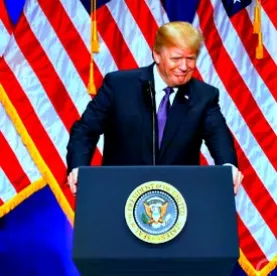The President’s attempt to suppress the publication of John Bolton’s book is a case of Constitutional vandalism.
Let’s start at the top. The First Amendment to the U.S. Constitution states that “no law” can be passed “abridging the freedom of speech, or of the press.” Those words are clear and precise. The Founders of the American Republic explicitly intended to stop the practice of the British Kings in suppressing publications before they were ever printed. President Trump and Attorney General Barr’s arguments attempting to further delay or suppress the publication of John Bolton’s book constitutes Constitutional vandalism.
Trump and Barr are attempting to misuse a small exception to rules prohibiting censorship in our Democracy. Courts have recognized that the government must be able to place some restrictions on former federal employees who were given special access to highly confidential information as a condition of their employment. Consistent with these decisions the federal government has created prepublication review requirements. But to meet the requirements of the First Amendment, prepublication review procedures must be severely limited. They must be narrowly designed to only prevent the publication of actual confidential information, but otherwise ensure that the American people will have access to information highly critical of their leaders.
The complaint filed by the Trump administration seeking to stop the publication of Mr. Bolton’s book ignores all of the First Amendment-mandated rules designed to prevent illegal suppression of speech. If successful it would radically expand the government’s censorship powers. Trump maintains that Mr. Bolton cannot publish his book without first obtaining the government’s permission. In their court papers the Trump Administration bluntly stated: Without “written authorization” from a presidential appointee, Bolton “cannot publish.”
This is not the law. Trump, like others before him, is hiding behind the legitimate concern over protecting national security secrets to cover-up his own embarrassing, and potentially criminal, misconduct. But based on the facts admitted by the government in its complaint filed in U.S. district court, President Trump’s new role as Censor in Chief must fail.
When resolving the tension between freedom of the press and the protection of state secrets courts faced a dilemma. On the one hand it is impossible to ignore the dictates of the First Amendment, and the history behind those uncompromising words: Congress can pass “no law” suppressing freedom of the press. But, on the other hand, there was a need to insure that truly confidential information was not improperly released. This tension weighed heavy on the judges deciding censorship cases. A compromise was reached. It is called “prepublication review,” but it is extremely limited.
Under this system the United States government requires employees who have access to confidential information to submit publications for review in order to ensure that properly classified information is not harmfully disclosed. When these rules were first announced civil libertarians strongly objected. Their arguments were legally irrefutable. Prepublication review was the precise harm the Founding Fathers targeted when they established the First Amendment. But the pragmatists in the courts prevailed, and a narrow prepublication review process was affirmed. This process is designed to facilitate the lawful and expeditious publication of information highly critical of the government. Prepublication review procedures are not a license to censor, they are a roadmap for publishing information the American people need to know to exercise their rights as citizens.
Recognizing the importance of the First Amendment, the courts put strict limits on pre-publication review procedures. These limits balanced the right of all federal employees to attack the President with legitimate concerns over releasing information that was properly classified. The legal principles applicable to the Bolton censorship case are clear. They start with the holding in the Pentagon Papers case, where the Supreme Court denied Nixon the very relief President Trump now seeks, i.e. an injunction that would prevent the publication of information highly critical of a sitting President.
The Pentagon Papers decision established limits the power of the federal government to suppress the publication of any book or article, the decision of the Court was unequivocal: “Any system of prior restraints of expression comes to this Court bearing a heavy presumption against its constitutional validity.” The Court continued: “the government thus carries a heavy burden of showing justification for the imposition of such a restraint."
In the Pentagon Papers case the government did not get to first base. Their request to stop the presses was denied and the Papers were widely published. The facts in the Bolton book case are far more clear.
Under prepublication rules the first burden the government must overcome is timeliness. The Trump administration flunks this test. As the Supreme Court has explained in other prior review cases: "It is vital to the operation of democratic government that the citizens have facts and ideas on important issues before them. A delay of even a day or two may be of crucial importance in some instances.”
Consistent with this holding courts have placed strict time limits on the prepublication review process. In an early case that has been positively cited by the Supreme Court (and other courts) the U.S. Court of Appeals for the Fourth Circuit explained the timeliness rule: “Undue delay would impair the reasonableness of the restraint, and that reasonableness is to be maintained if the restraint is to be enforced. We should think that, in all events, the maximum period for responding after the submission of material for approval should not exceed thirty days.”
The government’s own complaint details how the Trump administration failed to meet its deadlines. In short, Trump and his supporters blew it by trying violate the Constitution in delaying the publication of Bolton’s book and running out the clock. These illegal tactics are precisely why the Supreme Court has consistently warned against any delays in approving speech based on a prior review scheme.
In their complaint the Trump administration cites to a nondisclosure agreement signed by Mr. Bolton which they allege he violated. This agreement, entitled “Sensitive Compartmented Information Nondisclosure Agreement,” was attached to the Justice Department complaint. But the Trump censors did not read the small print in the agreement. This agreement required the United States to review and approve Mr. Bolton’ book within 30-days. The agreement states: “I understand that the purpose of the [prepublication] review . . . is to give the United States a reasonable opportunity to determine whether” the publication contains classified information. This “reasonable opportunity” must be exercised “within a reasonable time, not to exceed 30 working days from date of receipt.”
Based on admissions in the complaint the U.S. government has blatantly violated the rules governing prepublication, and has waived any rights they may have to further suppress release of the book or to threaten Mr. Bolton with sanctions.
The facts are clear. According to the Justice Department Bolton submitted the book for review on December 30, 2019. Thirty days passed. The book was not cleared. The argument could (and perhaps should) have ended there. According to the rules the American people should have had access to that book on January 30, 2020, in time for the impeachment proceedings. The failure to review and approve publication in some form or other by January 30thprejudiced the American people.
Instead, upon being threatened with some form of censorship due to alleged confidential material in his initial submission, Mr. Bolton decided to compromise his rights. Mr. Bolton did not demand that his manuscript be immediately cleared, thus forcing the government black-out any so-called confidential content. He could have released the censored book, and could have asked a court to review all of the President’s deletions and make expeditious de novo decision whether or not he could publish the facts the President was trying to hide. All of this would have been done in public view, during the impeachment proceedings.
But Mr. Bolton was a “nice guy” and participated in lengthy negotiations with his censors. In many respects, this negotiation process is an affront to freedom of speech. It is not required in the rules. It gives the executive an opportunity to pressure critics to hide information that the American people need to judge their rulers.
But regardless, Mr. Bolton cooperated. That cooperation paid off. According to the Trump administration’s complaint the censor with responsibility to review Mr. Bolton’s book concluded that it had no classified information. This is remarkable. The government admits that the censor cleared the book for publication on April 27, 2020. As conceded in the complaint the censor “completed her review and was of the judgment that the manuscript draft did not contain classified information.”
This decision was made in 119-days after submission of the manuscript for review, not the 30-days required under the Constitution.
But President Trump and his supporters apparently did not like what Bolton wanted to say. They decided to further flaunt the time requirements mandated by the Constitution. A new censorship scheme was hatched. The administration appointed a new censor, one with a background loyal to the President, and announced that they were starting the censorship process again. This move is unprecedented. If successful it will set a precedent that takes a wrecking-ball to basic Constitutional rights protecting the public’s right to know if their leaders are incompetent, crooked or just plain dumb.
Mr. Bolton is under no obligation to cooperate with this new censor. Any further delay in the publication of the book would harm the American people, defeat bedrock principles of American Democracy, and show evidence of cowardice that gives tyrants power.




 />i
/>i

